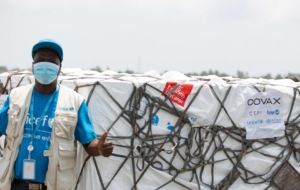News
Denmark doubles COVID-19 vaccine contribution to developing countries
This article is more than 4 years old.
The Development Ministry announces that another 50 million kroner will go to the international vaccine co-op COVAX

COVAX key in getting vaccines to developing countries (photo: UN)
According to the Foreign Ministry, Denmark is poised to double its COVID-19 vaccine contribution to developing countries.
To this end, the government has set aside another 50 million kroner for the international vaccine co-operation, COVAX.
“Denmark has a clear interest in the rest of the world gaining access to safe and secure COVID-19 vaccines as swiftly as possible,” said the development minister, Flemming Møller Mortensen.
“COVAX is a critical tool to ensure that, and that is why we will double down on our support. Only when the world around us is free of the pandemic will the threat to Denmark dissipate. No-one is safe until everyone is safe.”
Mortensen also revealed that the government was negotiating the terms of a fourth COVID-19 aid package.
READ ALSO: Denmark working to secure COVID-19 vaccines for the impoverished
COVAX is crucial
This effort will focus on supporting the build-up of health sectors in developing countries to better assist them to tackle future health crises.
The COVAX co-operation encompasses 191 countries – 99 of which are self-financing like Denmark, and 92 of which are classified as low-to-middle income countries.
COVAX expects to distribute 1.8 billion vaccine doses to the 92 countries, which will cover about 27 percent of their populations.
Since the pandemic started last year, Denmark has given 1.4 billion kroner to developing countries and humanitarian crises via COVID-19 aid packages.










































